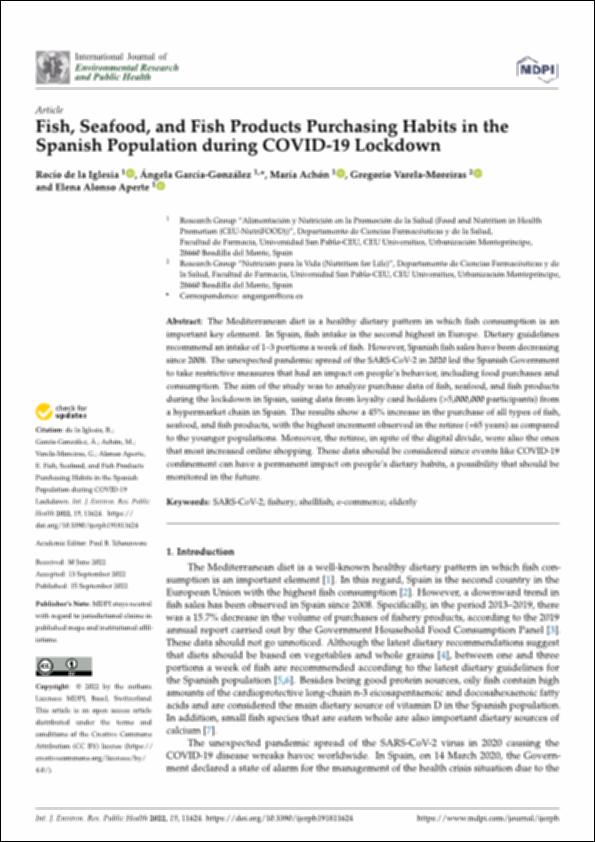Por favor, use este identificador para citar o enlazar este ítem:
http://hdl.handle.net/10637/14903Fish, Seafood, and Fish Products Purchasing Habits in the Spanish Population during COVID-19 Lockdown
| Título : | Fish, Seafood, and Fish Products Purchasing Habits in the Spanish Population during COVID-19 Lockdown |
| Autor : | Iglesia González, Rocío de la García-González, Ángela Achón y Tuñón, María Varela Moreiras, Gregorio Alonso Aperte, Elena |
| Materias: | SARS-CoV-2; Fishery; Shellfish; E-commerce; Elderly |
| Editorial : | MDPI |
| Citación : | Fish, Seafood, and Fish Products Purchasing Habits in the Spanish Population during COVID-19 Lockdown. de la Iglesia R, García-González Á, Achón M, Varela-Moreiras G, Alonso Aperte E. Int J Environ Res Public Health. 2022 Sep 15;19(18):11624. doi: 10.3390/ijerph191811624.PMID: 36141898 |
| Resumen : | The Mediterranean diet is a healthy dietary pattern in which fish consumption is an important key element. In Spain, fish intake is the second highest in Europe. Dietary guidelines recommend an intake of 1–3 portions a week of fish. However, Spanish fish sales have been decreasing since 2008. The unexpected pandemic spread of the SARS-CoV-2 in 2020 led the Spanish Government to take restrictive measures that had an impact on people’s behavior, including food purchases and consumption. The aim of the study was to analyze purchase data of fish, seafood, and fish products during the lockdown in Spain, using data from loyalty card holders (>5,000,000 participants) from a hypermarket chain in Spain. The results show a 45% increase in the purchase of all types of fish, seafood, and fish products, with the highest increment observed in the retiree (+65 years) as compared to the younger populations. Moreover, the retiree, in spite of the digital divide, were also the ones that most increased online shopping. These data should be considered since events like COVID-19 confinement can have a permanent impact on people’s dietary habits, a possibility that should be monitored in the future. |
| URI : | http://hdl.handle.net/10637/14903 |
| Derechos: | OpenAccess http://creativecommons.org/licenses/by/4.0/deed.es |
| ISSN : | 1660-4601 |
| Fecha de publicación : | 15-sep-2022 |
| Centro : | Universidad San Pablo-CEU |
| Aparece en las colecciones: | Facultad de Farmacia |
Los ítems de DSpace están protegidos por copyright, con todos los derechos reservados, a menos que se indique lo contrario.


